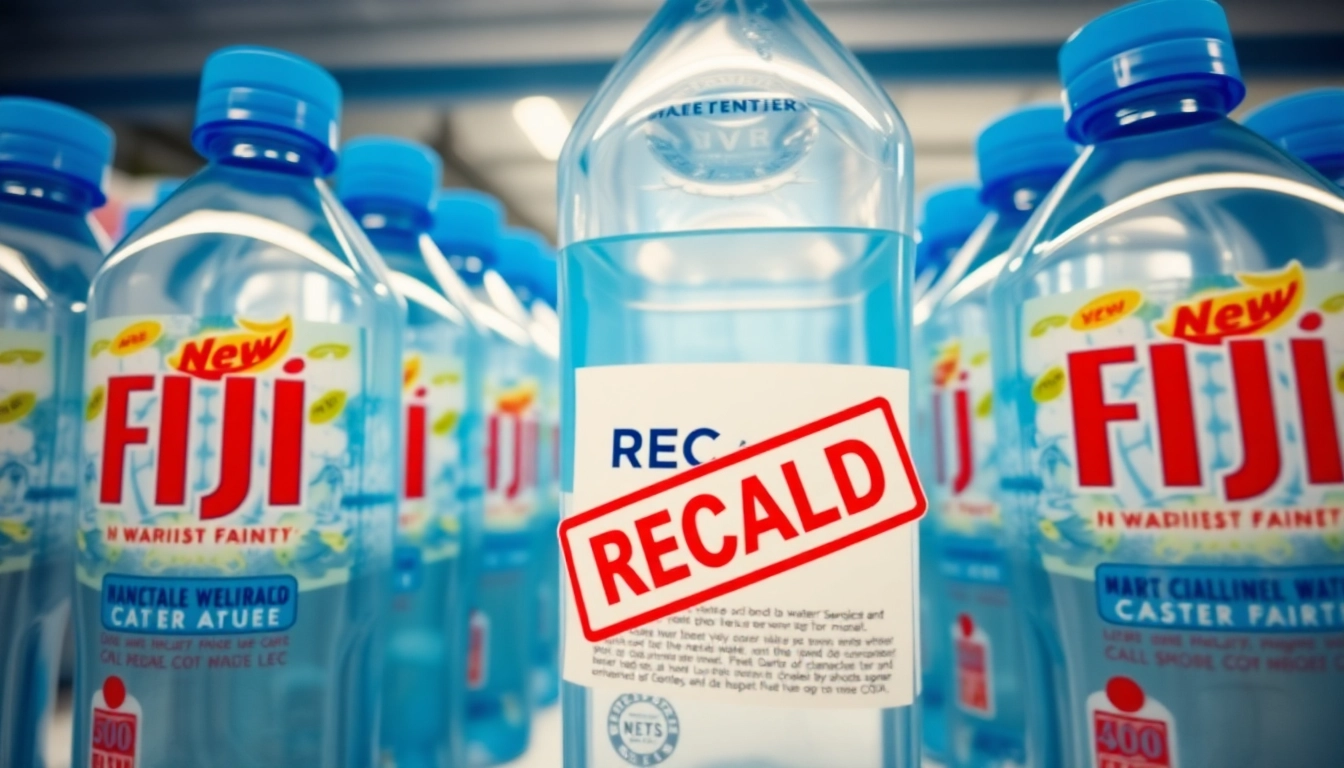Overview of the Fiji Water Recall
The bottled water industry is generally known for its stringent quality standards. However, recent events have highlighted the importance of vigilance in ensuring consumer safety. On May 23, 2024, the U.S. Food and Drug Administration (FDA) announced a significant recall affecting fiji water bottles recalled due to potential health risks. This recall included 78,533 cases of Fiji Natural Artesian Water, equating to approximately 1.9 million bottles. The recall was initiated because of concerns over contamination with manganese and bacteria, substances that pose health risks if ingested in elevated levels.
What Happened with Fiji Water Bottles?
The recall of Fiji Water is a classic example of the potential pitfalls in the bottled water industry. The root cause of the recall can be traced back to routine testing procedures which flagged certain batches of the product. Investigations revealed that these batches contained unacceptable levels of manganese, a naturally occurring mineral, along with three bacterial genera. While manganese is necessary in small amounts for bodily function, excessive exposure can lead to serious health issues, including neurological effects. Moreover, the presence of bacteria can pose acute health risks, particularly for vulnerable populations such as young children, the elderly, and individuals with compromised immune systems.
Details of the Recall Announcement
The FDA’s announcement outlined the recall as a Class III recall, indicating that the recalled products are not likely to cause any adverse health consequences, but they have been determined to pose a possible risk to consumers. Class III recalls are typically the least severe but nonetheless require immediate action from both consumers and distributors. Natural Waters of Viti Limited, the manufacturer of Fiji Water, conducted the recall in a bid to uphold their commitment to public health and safety.
Key Statistics on Recalled Fiji Water Bottles
The numbers speak volumes about the scale of this recall. Specifically, 78,533 cases of Fiji water were recalled, which translates to an astounding 1.9 million bottles. This doesn’t just affect the manufacturer; it extends to a vast network of retailers and consumers across the U.S., particularly those who purchased the affected product through online platforms like Amazon. Given the circumstances, it’s crucial for consumers to stay informed about recalls such as this and to take appropriate precautions.
Health Risks Associated with Contaminated Water
Understanding the implications of consuming contaminated water cannot be overstated. When health agencies identify potential contaminants, it’s essential for consumers to be aware of the risks involved.
Understanding Manganese and Its Effects
Manganese is a mineral that an individual requires in small amounts for physiological functions. It plays a role in bone formation, blood clotting, and reducing inflammation. However, excessive manganese exposure—especially through contaminated drinking water—can lead to serious health concerns. High levels of manganese can cause toxicity that adversely affects the nervous system, resulting in symptoms akin to Parkinson’s disease. Long-term exposure can also cause developmental issues in children and may impact cognitive abilities.
Potential Bacterial Contamination Risks
Bacterial contamination is another significant concern in water quality. The presence of harmful bacteria can lead to gastrointestinal disturbances, infections, and serious health consequences. Common bacterial contaminants include E. coli, Salmonella, and Legionella. In the context of the Fiji Water recall, the specific bacteria detected were not disclosed in the FDA recall notice; however, it serves as a reminder for the importance of water quality testing and responsible sourcing.
Symptoms of Contamination to Watch For
With potential contamination comes the need for awareness regarding symptoms. For manganese toxicity, symptoms may include:
- Tremors or twitching
- Cognitive difficulties
- Lethargy or fatigue
In terms of bacterial contamination, individuals may experience:
- Nausea and vomiting
- Diarrhea
- Fever and abdominal cramps
If you experience any of these symptoms after consumption of potentially contaminated water, it is essential to seek medical advice immediately.
Understanding the Recall Process
The recall process is a mechanism designed to protect public health by removing hazardous products from the market swiftly. It often involves regulatory agencies like the FDA or CDC, along with the manufacturers and retailers of the products.
What is a Class III Recall?
A Class III recall occurs when a product is not likely to cause adverse health effects but does not meet the FDA’s regulatory standards for safety and quality. The recall aims to prevent potential consumer exposure to products that could be substandard. Understanding this classification helps consumers evaluate the severity of the situation and the urgency of their response.
FDA’s Role in Product Recalls
The FDA plays a pivotal role in overseeing product recalls. They establish guidelines for safe manufacturing practices, conduct regular inspections, and respond rapidly to reports of potential issues. In the case of Fiji Water, the FDA received preliminary reports about potential contamination and acted quickly to issue a public alert and guide affected consumers.
How to Check if Your Bottles are Affected
Consumers who are concerned about their Fiji Water purchases can easily check whether their bottles are included in the recall. Here are some steps:
- Identify the lot number: This can typically be found on the bottom of the bottle or on the packaging.
- Visit the FDA’s official website for recall notices or check Fiji Water’s official site for information.
- If in doubt, contact customer service for clarification regarding your product.
Consumer Actions After the Recall
In the wake of a recall, being informed and proactive can greatly affect consumer safety and satisfaction. Here’s how to navigate the aftermath of the Fiji Water recall.
What to Do if You Purchased Recalled Fiji Water Bottles
First, determine whether your affected bottles are part of the recall. If they are, stop consuming the water immediately. Dispose of the bottles properly and keep them out of reach of children and vulnerable individuals. Document your bottles, including photos of the label and lot numbers, as this information may be necessary for claim processing or refunds.
How to Get Refunded or Replaced
Fiji Water has a customer service protocol in place for those who were impacted by the recall. Consumers typically can seek refunds or replacements through the following means:
- Contact Fiji Water’s customer service via their website or by phone.
- Provide them with the necessary details regarding your purchase and the lot number of the bottles.
- Follow their instructions for returning the product or for obtaining a refund.
Retailers such as Amazon may also provide refunds for recalled products purchased through their platforms, so checking with them directly is advisable.
Staying Updated on Future Products
To stay informed on future recalls and safety concerns, consider subscribing to updates from the FDA or checking their website periodically. Additionally, manufacturers such as Fiji Water often provide newsletter sign-ups for consumers to receive timely news on product safety, recalls, and new product launches.
Alternatives and Best Practices for Water Safety
While bottled water remains a popular choice for hydration, understanding the dynamics of water safety enables consumers to make informed decisions about their water consumption.
Choosing Safe Bottled Water Options
When selecting bottled water, look for brands with rigorous quality assurance practices. Research brands and their sourcing methods, and check for third-party testing. Water should meet or exceed the quality and safety standards set forth by the FDA. Also, consider supporting local producers who may have a lower risk of contamination due to regional sourcing.
Best Practices for Home Water Filtration
For those who prefer drinking water at home, investing in a high-quality water filtration system could be a cost-effective and safe alternative to bottled water. Here are essential tips:
- Choose the right filtration system based on your water source—consider reverse osmosis or activated carbon filters for effective contaminant removal.
- Regularly maintain and replace filter cartridges as recommended by the manufacturer.
- Test your home water quality periodically to ensure it remains safe for consumption.
Monitoring Your Drinking Water Quality
Understanding the quality of your drinking water is vital for health. Home testing kits are available that can identify the presence of contaminants such as lead, nitrates, and bacteria. Keeping track of your local water quality reports will also provide insight into potential hazards. Additionally, engagement in community efforts focused on water safety can foster broader public awareness and advocacy for safer drinking water practices.



